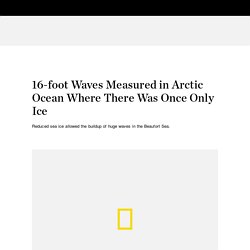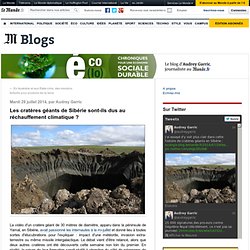

2014/07/21 > BE Australie 68 > Une étude sur le climat met en évidence un vent de changement. EnvironnementUne étude sur le climat met en évidence un vent de changement Une équipe de recherche internationale, menée par un expert en écologie marine de l'University of Sunshine Coast (USC) dans le Queensland en Australie, a confirmé que le réchauffement climatique est un moteur de changement dans plusieurs écosystèmes côtiers vitaux.

16-foot Waves Measured in Arctic Ocean Where There Was Once Only Ice. Sixteen-foot waves are buffeting an area of the Arctic Ocean that until recently was permanently covered in sea ice—another sign of a warming climate, scientists say.

Canada’s boreal forests are burning – and releasing loads of carbon. Rumbling afternoon thundershowers are breaking over the Southwest, bringing gratitude and sweet relief – not that the region needed much relieving this year.

Bouts of cool, wet weather throughout early summer helped stave off the conflagrations predicted to erupt after a dry winter, and by mid-July, most areas had already been deluged by a full month’s worth of rainfall. Les cratères géants de Sibérie sont-ils dus au réchauffement climatique. La vidéo d'un cratère géant de 30 mètres de diamètre, apparu dans la péninsule de Yamal, en Sibérie, avait passionné les internautes à la mi-juillet et donné lieu à toutes sortes d'élucubrations pour l'expliquer : impact d'une météorite, invasion extra-terrestre ou même missile intergalactique.

Le débat vient d'être relancé, alors que deux autres cratères ont été découverts cette semaine non loin du premier. En réalité, la raison de leur formation serait plutôt à chercher du côté de relargages de gaz dus à la fonte du permafrost – les sols en permanence gelés – sous l'effet du réchauffement climatique. Selon des scientifiques interrogés par le Siberian Times, le premier cratère, aux proportions impressionnantes de 30 mètres de diamètre et 70 mètres de profondeur, se serait formé il y a un ou deux ans. What is climate change doing to our mental health? About a year ago, I started wondering about the impact of climate change on mental health.

After all, depression is already the second leading cause of disability around the world, depression can be kicked off by stress, and watching the ocean inch up to your doorstep or seeing drought destroy your crops and take away your livelihood can be pretty nerve-racking. I checked the most recent IPCC report. Nothing on mental health. I checked news articles. Climate change may slowdown crop yield, study finds. Climate change makes 20 times more likely for corn and wheat crop production to decrease, significantly affecting food prices and availability in the long-term, according to a new study. Scientist from Stanford University and the National Center for Atmospheric Research (NCAR) have said in a new study that although a massive and severe crop production slowdown is unlikely, global warming increase the risk of losses by 20 times. There is therefore a substantial risk of decreasing production of wheat and corn, which would not keep up with rising demand in the next 20 years, the study argues.
Stanford professor David Lobell said, “I’m often asked whether climate change will threaten food supply, as if it’s a simple yes or no answer. “The truth is that over a 10- or 20-year period, it depends largely on how fast the Earth warms, and we can’t predict the pace of warming very precisely. En juillet 2012, la planète a évité de peu le blackout généralisé. 2014/07/21 > BE Australie 68 > Une étude sur le climat met en évidence un vent de changement.
Wanna see what climate change looks like? Check out the vicious fires in northwest Canada. Lightning, an intense heat wave, and low rainfall are lighting up northwestern Canada like a bonfire, producing conflagrations that scientists are linking to climate change.

More than 100 forest fires are burning in Canada’s lightly populated Northwest Territories, east of Alaska. Some residents are being evacuated from their homes; others are being warned to stay inside to avoid inhaling the choking smoke. Take a look at the latest map produced by the region’s fire agency: Pour la NOAA, l'année 2013 fut l'une des années les plus chaudes jamais enregistrées. Selon un rapport de référence publié par l'Agence océanique et atmosphérique américaine (NOAA), l'année 2013 fut l'une des années les plus chaudes jamais enregistrées, les gaz à effet de serre ayant atteint des niveaux historiques et les glaces de l'Arctique continué à fondre.

Le mois de juin 2014 le plus chaud depuis 1880. Le mois de juin 2014 a été le plus chaud dans le monde depuis le début des relevés des températures en 1880, a indiqué aujourd'hui l'Agence américaine océanique et atmosphérique (NOAA).

L'Australie abolit sa taxe carbone. Scientists Confirm Burning Fossil Fuels Significantly Worsens Australian Drought. American scientists have just confirmed that parts of Australia are being slowly parched because of greenhouse gas emissions, which means that the long-term decline in rainfall over south and south-west Australia is a consequence of fossil fuel burning and depletion of the ozone layer by human activity.

Such a finding is significant for two reasons. One remains contentious: it is one thing to make generalized predictions about the consequences overall of greenhouse gas levels, but it is quite another to pin a measured regional climatic shift directly on human causes, rather than some possible as-yet-unidentified natural cycle of climatic change. The other is contentiously political.
Rupert Murdoch Says Climate Change Should Be Approached With Great Skepticism. By Ari Phillips "Rupert Murdoch Says Climate Change Should Be Approached With Great Skepticism" CREDIT: AP Photo/Josh Reynolds Rupert Murdoch is chairman and CEO of News Corporation, one of the world’s largest media conglomerates, which includes Fox News and The Wall Street Journal.

Climate change is flooding out American coastlines. The U.S. cities with the worst climate change-related flooding. What’s the most pernicious climate-change threat facing the U.S. in the years to come? It might not be lung-scorching air pollution, less-nutritious crops, or super-fueled wildfires, but rising sea levels repeatedly swamping coastal cities, according to a new NOAA report. The number of “nuisance flooding” days in the U.S. has shot up markedly since the middle of last century, by as much as 925 percent in Annapolis and 922 percent in Baltimore. And as the oceans continue to swell – a byproduct of melting glaciers and the heat expansion of water — we can expect these waterlogged days to become yet more common, especially on the East Coast, says the report’s lead author, William Sweet.
Watch this adorable climate scientist explain sea-level rise with a gin & tonic. Cold front brings freak weather across Ural and ea... - The Watchers. Abnormal summer snowstorm hit Russia's Ural region on July 12, 2014. Snow fell in cities of Chelyabinsk and Sverdlovsk, located in Russia's eastern Ural region, in the middle of summer; sudden temperature drop from over 20 degrees Celsius to almost zero and strong winds produced snowdrifts along the roads. Summer time in this region is similar to Mediterranean and snowstorm in the middle of July is extremely rare. Dramatic video emerged on Youtube, showing the hailstorm surprised beach goers on the banks of the Ob River in Novosibirsk: Eastern Siberian city of Novosibirsk experienced temperatures as hot as 37 degrees Celsius just before an unusual hailstorm hit the region.
The arrival of a cold front was accompanied by stormy weather with stormy gusts and hail which have reached maximum grain size of tennis balls. 17 people sought medical attention in hospital due to injuries suffered during the storm. North Carolina's Outer Banks 'Ban' Rising Seas. Politicians in the United States have been accused of trying to make rising sea levels illegal. When scientists in North Carolina predicted global warming will cause a rise of at least a metre by the end of the century in the seas off the Outer Banks it caused uproar among businesses and property owners.
Prévention des inondations : l’Etat refile 50 000 kilomètres de digues aux collectivités locales ! La technologie, clé contre le changement climatique. La limitation du réchauffement climatique à 2° Celsius est possible mais seulement si d'importants progrès technologiques sont réalisés et si les principaux pays émetteurs adoptent des politiques ambitieuses sur le carbone, selon un rapport remis à Laurent Fabius dans la perspective du sommet sur le climat que Paris accueillera fin 2015. We Are Making Ebola Outbreaks Worse by Cutting Down Forests.
Health workers teach people about the Ebola virus and how to prevent infection, in Conakry, Guinea, in March.Youssouf Bah/AP In a relentless sweep across Guinea, Liberia, and Sierra Leone, the largest outbreak of Ebola, a virus that causes dramatic internal bleeding and often a hasty death, has now claimed 467 lives, from 759 infections, since February this year, according to the World Health Organization (WHO). With victims identified across more than 60 different locations, there's now a very real risk the outbreak will spread to even more countries, says Médecins Sans Frontières (MSF), which calls the epidemic out of control. WHO is now focusing on preparing for the disease's inevitable spread to neighboring countries, not a small ask in poor countries with poor health care systems. Ebola hemorrhagic fever outbreak in Guinea, Liberia, and Sierra Leone, 2014. Agriculture: The Surprising Leading Contributor to Pollution. By Dr. Mercola Did you know that the modern agricultural system is responsible for putting more carbon dioxide into the atmosphere than the actual burning of fossil fuels?
Understanding this reveals an obvious answer to pressing global problems. Snails already live in fear; now they’ve got climate change to worry about, too. It’s a well-known scientific fact that a human’s greatest fear is going to work only to realize you are, in fact, buck naked. A close second, however, is knowing that you are completely surrounded by creatures who plan to eat you as you go about your daily business. And while animals routinely show up for work nude, they are not immune to the whole fear-of-being-devoured bit.
The Amount Of Carbon Dioxide In Our Air Just Reached A New Record, And Scientists Are Worried. By Emily Atkin "The Amount Of Carbon Dioxide In Our Air Just Reached A New Record, And Scientists Are Worried" CREDIT: shutterstock On Monday, scientists at the National Oceanic and Atmospheric Administration’s Mauna Loa observatory in Hawaii told Climate Central that June would be be the third month in a row where, for the entire month, average levels of carbon dioxide were above 400 parts per million (ppm). In other words, that’s the longest time in recorded history that this much carbon dioxide has been in the atmosphere. The finding is troubling to climate scientists, several of whom told ThinkProgress on Monday that the levels are a reminder that humans are still pumping too much carbon dioxide into the sky.
“CO2 levels continue to increase, the amount of heat in the climate system continues to increase, ice continues to melt, and the seas continue to rise,” said Ken Caldeira, an atmospheric scientist at the Carnegie Institution for Science’s Department of Global Ecology. Image. Ocean acidification could be creating friendless fish. Fish seem like chummy enough creatures, often schooling with fish they’re familiar with to avoid predators and increase the chances of finding a mate.